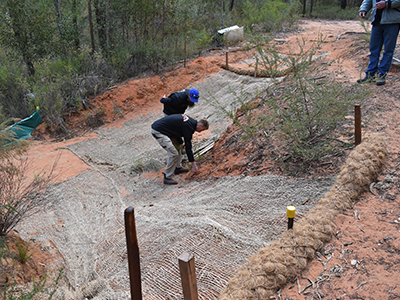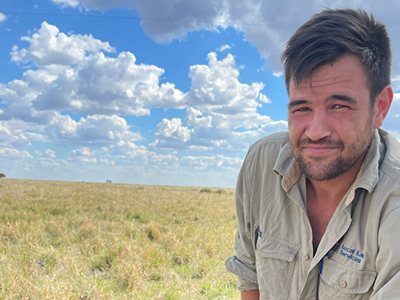Transformations through the Aboriginal Ranger Program
13 Jul 2023
The Local Land Services Aboriginal Ranger Program was launched in July 2022 and is being delivered across the Central West, Murray, Riverina and North West Local Land Services regions.
The program is designed to enhance Aboriginal people’s connection to Country and provide meaningful career pathways through formal training and implementing learnings.
Central West Aboriginal Rangers have been putting their knowledge into practice on a travelling stock reserve close to Coonabarabran with high biodiversity and Aboriginal cultural values. The reserve is being transformed into a meeting place for the community and outdoor space for practicing traditional Aboriginal customs.
The site is being fenced off to protect the high value conservation area and cultural heritage sites present through restricting unauthorised vehicle access which will reduce illegal dumping and the general degradation of the site.
The project area will be revegetated, maintained and preserved as a significant cultural space for the whole community.
Local Land Services Business Partner Aboriginal Cultural Engagement Graham Kelly said the program has upskilled participants giving them qualifications and experience through on-ground projects.
“The guys are doing their Certificate III in Conservation and Ecosystem Management and then get to apply the skills they have learned through projects like this where they are transforming the reserve into a meeting place for people to learn the ways of our mob,” Mr Kelly said.
“The rangers have created areas for traditional men’s business and women’s business with dancing circles and yarning circles.
“We’ve had a number of gatherings here and I’m getting plenty of enquiries from people now wanting to use the space.”

Image: Rangers Jamie and Jayden onsite erosion control methods as part of their certification.
Central West Aboriginal Ranger Team Supervisor Will Robinson said it has been rewarding seeing the area being used by the community after their work to improve it.
“We’ve removed truckloads of rubbish, done earthworks to improve the roads, had cultural burns and will continue to manage pests and weeds on the site.
“We are working to finish putting in walking tracks and want to install signage to help educate the community about what they are seeing on the site and Aboriginal cultural practices.”
Aboriginal Ranger Jayden Moore said he loves being part of the ranger program and hopes to eventually secure long-term employment where he can be in the bush and apply what he has learned.
“We’ve done cultural burns, site surveys, learned to identify native plants and I’ve really enjoyed learning about community consultation,” Mr Moore said.
Aboriginal Ranger Jamie Fuller said being able to transform an area in the town he grew up in has been motivating and rewarding.
“It’s where I want to be, in the bush, creating something for the community to enjoy and teaching everyone about our culture.”
The site is open to pedestrian access with low impact recreation encouraged including bushwalking and cycling.

Image: Michael Grant, Conservation Field Support Officer
In the Murray region, Michael Grant, an Aboriginal man from Thwutti and Mathiyeal Country, has been working as a Conservation Field Support Officer based in Deniliquin for the past 18 months. His role also involves managing flora and fauna pests on travelling stock routes.
“Our team in Deniliquin has located an Aboriginal burial site along a local travelling stock route, and they are now working to fence the site to minimise any damage from travelling stock, but also keep vehicles and rubbish off the site.”
Michael said working in his role helps him contribute to his regional community.
“I work with local land holders to help them better manage and deal with pests and weeds, whilst also keeping fences on stock routes in good condition,” he said.
“I also manage drovers and their cattle while they are on travelling stock reserves, including maintaining cattle holding yards and making sure there is a secure water source for them while they are travelling through the area.”
Michael said the Aboriginal Rangers work on different projects across Local Land Services, ranging from weed and pest control projects to revegetation and erosion control.
“Throughout the program, each team is given a task to create and manage a project within their respective regions,” he said.
“The program aims to provide meaningful employment for local Aboriginal trainees to upskill them, help them gain exposure and development within a government agency, and provide a potential career pathway in Local Land Services.”
“The most rewarding part of my role is representing Aboriginal people in a government agency and working with local organisations - both Indigenous and non-Indigenous - to improve the overall health and wellbeing of our surrounding lands and town,” he said.
“Being in a role that contributes and helps communities is especially important to me. Healthy Country equals healthy people and communities.”
“The Aboriginal Ranger Program aims to help upskill and employ local Aboriginal people to enhance our local Indigenous and non-Indigenous communities by working together to enhance the lands and keep a healthy and productive ecosystem,” Michael said.
For further information contact Local Land Services on 1300 795 299.